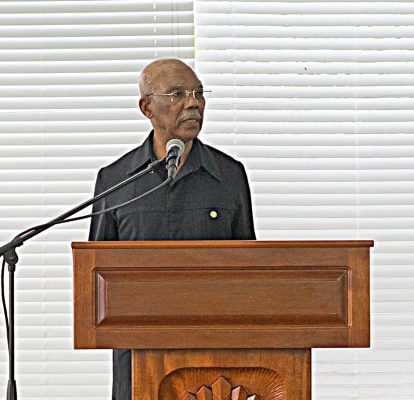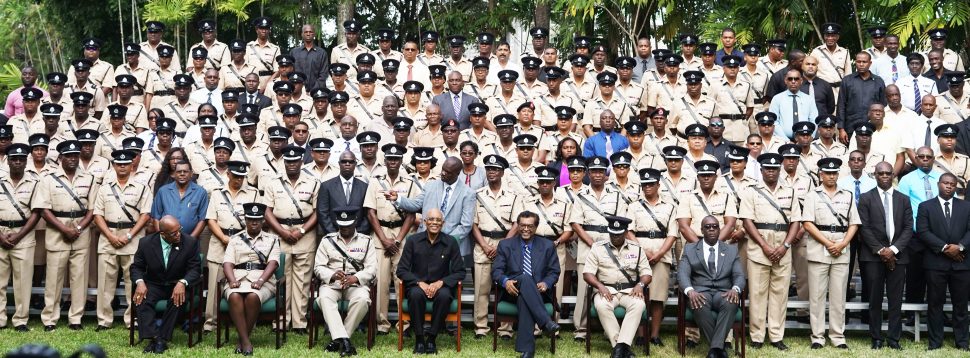President David Granger yesterday urged ranks of the Guyana Police Force to rise above their existing “challenges” and properly manage the available resources to ensure that public security is maintained.
“…Most parts of the country are accessible only by aircraft, of which the police force has none; boats, of which they have a few; foot of which they have 4,600 pairs or by horse but the police have to go there,” he said at the opening ceremony of the Police Officers’ Annual Conference at State House, where he stressed the need for the implementation of key recommendations made by British expert Lt Col (rtd) Russell Combe to be fast-tracked this year.
In delivering the feature address, he reminded the 183 officers in attendance that while demographic and geographic factors place a “burden” on the force’s organisational, operational, administrative and human capabilities, it must manage its resources “in order to accomplish the complex task of maintaining public security in this complex country.”

Granger pointed out that the force is “distributed very unevenly” throughout the ten regions of Guyana and has a total of 73 stations and 26 outposts. He noted the shortage of human resources that the force continues to face. “The force’s membership of about 4,600 is inadequate and needs to be augmented,” he said.
When approached subsequently, Police Commissioner Leslie James was unable to say how many more ranks are needed for the force to reach full strength.
“At this point, we don’t have a figure but based on the inadequacy. We’ll examine it and wherever is the need, we’ll pursue that,” he told reporters.
Granger, meanwhile, used a part of his 20-minute-long speech to reassure ranks that government is serious about ensuring there is security sector reform.
He said that the reform is being pursued and it is expected that these will be aimed at restoring public trust, reinforcing the force’s capability to fight crime and promoting men and women only of the highest integrity to become officers.
“Security sector reform is aimed at improving public trust and confidence, developing a stronger organisation, boosting the force’s intelligence, response and investigative capabilities and producing a more versatile police officer,” the president said, while explaining that it must be accelerated this year for these reasons.
He said security sector reform will revise the force’s institutional framework and in this regard he noted that the police divisions are being restructured to correspond to governmental regional divisions.
He said that the reform will also allow the force to address the problems of chronic under-funding, lack of adequate planning and the low standards identified in Combe’s report.
The report was submitted to Granger since January last year. When asked about its release, the president assured that it will be made public.
“It’s not secret. If it was a secret we would have kept it to ourselves but we have sent a copy…I would like to confirm that but I am very sure it was sent to the Leader of the Opposition and it is meant to be laid in the National Assembly. It’s a public document. Public security is a public responsibility,” he told Stabroek News.
Granger told the officers and invited guests who were gathered at State House that the reform will reverse the force’s record of poor maintenance and the abuse of its moveable and immoveable assets, place greater attention to the selection and training of its constables and cadets; enhance the welfare of its constables and subordinate officers by improving the conditions under which some of them live and work, particularly west of the Essequibo, and to ensure promotions are based on hard work, integrity and merit.
Granger also stressed that the safety of citizens, the security of the state and the stability of the economy are the government’s paramount concern as he noted that they would enable citizens to go about their everyday business without fear. “Such a state it protects citizens and their property and ensures an enabling environment for leisure and lawful economic activities,” he noted.
Guyana, the president said, cannot fulfill its potential as a peaceful and prosperous nation unless it is secure and stable. He added that security and stability can be guaranteed best by a strong police force.
Public trust
He further said that if the force is to maintain public security, it must ensure that there is public trust. He reminded that bribery is a notorious crime because of its contribution to corruption, thereby undermining public trust. He said that it is for this very reason he had disclosed that one of the qualities he was looking for in a police commissioner was that the person be unbribable.
Granger also used the occasion to remind the officers of the role of the Police Complaints Authority, while noting that the appointment of this body is consistent with government’s commitment to increase public trust in the force. He said that the Authority can serve as a critical link between the police and the public by providing the means through which the public can have its grievances against police malpractice addressed in an impartial manner and by ensuring that the force’s actions are in conformity with human rights.
He also highlighted the importance of the Police Service Commission.
James, in his remarks, also alluded to the reform. He said the force is at an important juncture in terms of reform, given engagements with counterparts in the United Kingdom. He said that out of this engagement, the implementation of the three main pillars–infrastructure, training and human resources management—has already started. He noted that after taking up his new role as Commissioner, he and his four deputies have met with the staff in all police divisions in a bid to demonstrate leadership through a collective effort.
James also reminded that as of the end of last year there was an 11% reduction in serious crimes. Armed robberies were reduced by 13.2%, while there was also a 6% decrease in road fatalities. He said it is important that the force suppresses crime and violence and to enhance systems to maintain law and order throughout the country.
Meanwhile, Deputy Commissioner Paul Williams, who has responsibility for Administration, delivered a welcome address and revealed that training is high on the agenda. He also noted that several ranks are abroad pursuing higher education in various disciplines, including cyber security.
Among the things that will be discussed during the conference are General and Regional Elections; the critical examination of police powers to stop, search and detain; the new Juvenile Justice Act and the code for prosecutors; security implications at the two airports; private security, its growth and implication; behavioural science and the future for managing human resources. Williams said that presentations on these subjects will be delivered by external intellectuals.
The three-day conference is being held under the theme “Security Sector Reform Implementation – Enhancing Capacity through Training, Infrastructure and Human Resource Management.”





